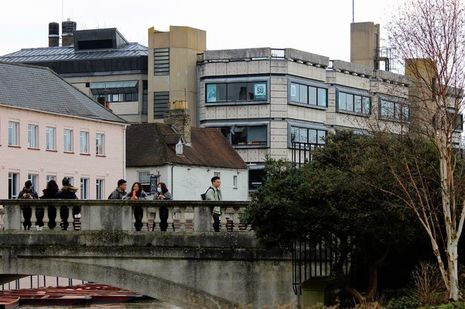Students display art exhibition about drugs
The display ‘aims to spark conversations about the world we build around them, and the worlds they build around us’

A group of students at Homerton College have launched an art exhibition in the Students’ Union (SU) in collaboration with students from Mexico, in order to highlight “critical and creative takes on the topic of drugs”.
The exhibition – titled “Drugscapes: Are we all users?” – is being launched today (30/05) by “Rethinking Drugs (ReD),” a network of undergraduate and postgraduate students in the UK and Mexico who have an interest in drugs and drug policy. It will run until June 10 in the SU Lounge on the third floor of the University Centre.
The exhibition features the joint work of over 50 media students from Universidad Iberoamericana in Mexico City and students from Homerton, guided by the question: “In a world flooded with mind-altering substances and technologies – are we all, in some ways, users?”
According to ReD, the “exhibit does not set out to tell you how you should or should not relate to psychoactive substances. Rather, it aims to spark conversations about the world we build around them, and the worlds they build around us.”
Theo di Castri, a Junior Research Fellow at Homerton and one of the founders of ReD, told Varsity: “We were a bit shocked to discover that the colleges and university seem to have little to no real data regarding student’s drug use, their attitudes towards substance use, etc. It’s hard to imagine how responsive harm reduction policies could be implemented without a better understanding of all this.
“Accordingly, as a step towards countering this, we’ve launched our own exploratory harm reduction survey at Homerton College (which will be on display at the exhibit!). Our hope is that this exhibit will get more students thinking about the topic, spark a broader dialogue about drugs within the University and will hopefully inspire others to start similar initiatives at their colleges,” he added.
Lucy Pawlak, a filmmaker and media studies professor who also worked on the project, stated alongside di Castri: “Where traditional drug education programs tend to take the shape of instrumental, pre-packaged interventions aimed at securing pre-determined behavioural outcomes (e.g. abstinence, or responsible drug use), the class [of artists] explored an alternative, more open ended approach…The pieces on display reflect the diversity of their creators’ interests, personal experiences and ethico-political stances towards drugs.”
This comes less than a month after the University of Cambridge launched the Cambridge Psychedelic Research Group (CPRG) for research into psychedelic-assisted therapy for mental health, offering the first psychedelic-based treatments in the East of England.
In January, a Varsity investigation into drugs and alcohol usage in Cambridge found that only one in three students have taken Class B drugs, while 15% have taken Class A drugs. This was higher than the national average, according to an ONS survey which found that 10% of those aged 16 to 24 had taken Class A drugs and just over a quarter had smoked cannabis.
The University of Cambridge was contacted for comment.
 News / ‘Out of the Ordinary’ festival takes over Cambridge 26 August 2025
News / ‘Out of the Ordinary’ festival takes over Cambridge 26 August 2025 Comment / Who could possibly want more exams?25 August 2025
Comment / Who could possibly want more exams?25 August 2025 News / Council rejects Wolfson’s planned expansion28 August 2025
News / Council rejects Wolfson’s planned expansion28 August 2025 News / Council criticised after market plans announced27 August 2025
News / Council criticised after market plans announced27 August 2025 News / Tompkins Table 2025: Trinity widens gap on Christ’s19 August 2025
News / Tompkins Table 2025: Trinity widens gap on Christ’s19 August 2025










